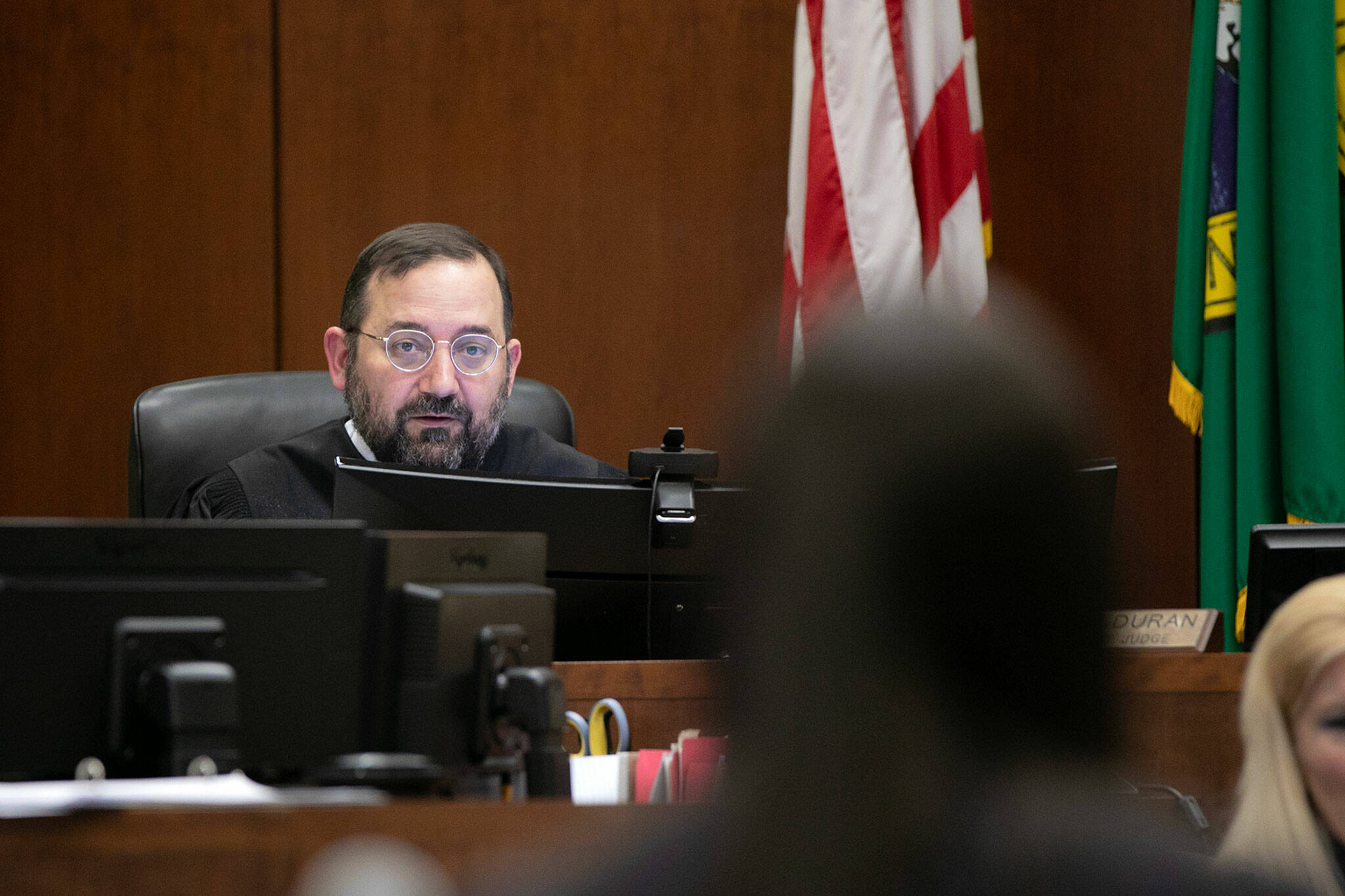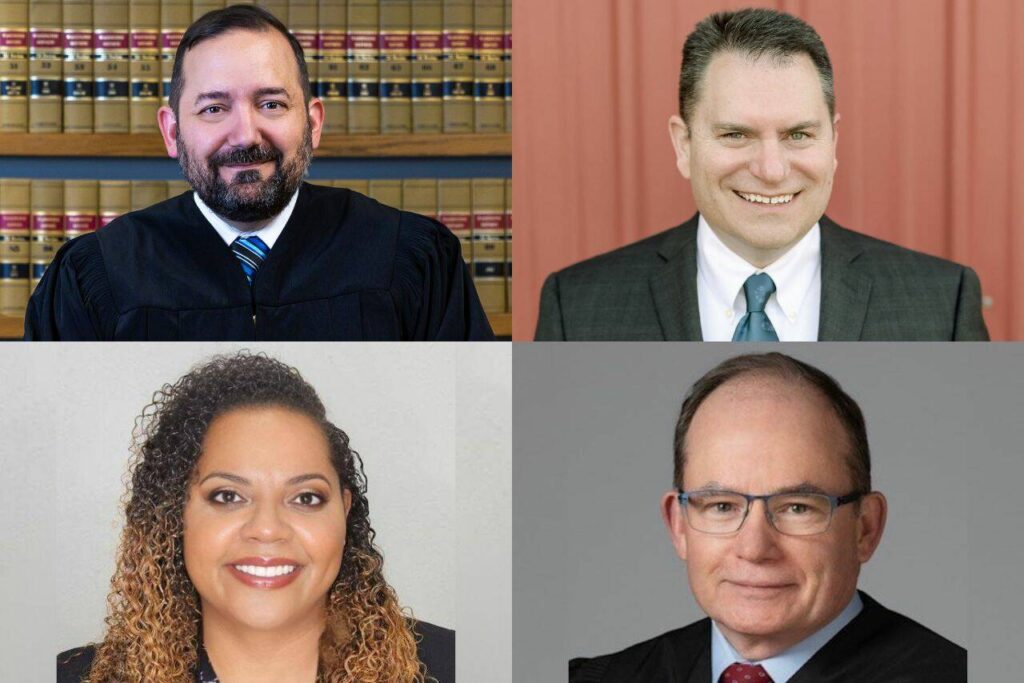EVERETT — Candidates for two judge seats on the Snohomish County Superior Court raised over $292,000 in this year’s election.
Much of that campaign cash was self-funded: $118,000.
Another $57,000 came from their fellow judges and lawyers. At least 46 attorneys contributed, according to a Daily Herald review of campaign finance records.
Several of those attorneys have tried cases in front of the incumbent judges, who both won their races this month.
It raises the question: Is that a clear and convincing conflict of interest?
Under the American Bar Association’s bylaws: “Lawyers have a right to participate fully in the political process, which includes making and soliciting political contributions to candidates for judicial and other public office.”
Research suggests political contributions can sway judge’s decisions, but not always.
In one study, researchers looked at state Supreme Court decisions in Michigan, Texas and Nevada. Judges in Michigan and Texas are partisan positions. In Nevada, like Washington state, they’re not. Researchers found evidence of a quid pro quid relationship in Michigan and Texas, but not Nevada.
Another study found “contributions from pro-business groups, pro-labor groups, doctor groups, insurance companies, and lawyer groups increase the probability that judges will vote for the litigants favored by those interest groups.”
The state Code of Judicial Conduct stipulates judges are not allowed to solicit or accept donations themselves, outside of family members and people serving on their campaign committee.
They can, however, establish committees to take in campaign money.
For Judge Miguel Duran, who was originally appointed by Gov. Jay Inslee, only his campaign treasurer accepted contributions.
“Judges, judicial candidates and lawyers in the community are very well aware that judges are insulated, by their campaign treasurer and consultant, from even knowing who has contributed to our campaigns or what amounts,” Duran wrote in an email. “Due to these carefully and thoughtfully created safeguards, advisory opinions on the subject have stated that it is not a conflict of interest.”
‘Even when I lose’
Of the five candidates for Snohomish County Superior Court this year, Judge Patrick Moriarty had the most support from his legal colleagues.
Moriarty began his legal career in 1991 as a public defender. He worked as a prosecutor in Seattle in the late 1990s and dabbled in private law before going back to public defense in Snohomish County. In 2022, Inslee appointed Moriarty to his current position.
Before that, he served as a judge pro tem in municipal and district courts throughout the county for 17 years.
Moriarty’s contributions this year totaled over $86,000, the eighth-most for a Snohomish County judicial campaign since 2008. Moriarty, as well as people who share his last name, contributed over $24,000.
At least 32 attorneys gave money to Moriarty, totaling over $21,000. He also received contributions from at least 26 judges, which totaled over $19,000. Of those judges, 12 currently serve on the Snohomish County Superior Court. Judges from King County also donated. Moriarty also received cash from at least six retired judges.
Nine law firms also pitched in.
“Because of my long career, and my decades in judicial roles, many attorneys who had cases against me when I was practicing law here and some who respect my work on the bench have stepped up to endorse me,” Moriarty wrote in an email. “Some of those have donated to my campaign effort, and I am appreciative of their support.”
He added: “However, campaign donations from attorneys who know me and respect me and who wish to see me retain my seat on the bench do not constitute a conflict of interest. And there is no rule that says that. They recognize, I presume, that all successful campaigns require money, and they want to see me retain my seat.”
Several of those attorneys had cases heard by Moriarty.
“Judge Moriarty is one of the best judges I’ve ever appeared before,” Dubs Herschlip, a Mukilteo attorney, wrote in an endorsement.
Herschlip, who specializes in corporate law as a partner at Dunlap, Bennett & Ludwig, said he rarely donates to judges, but contributed $250 to the Moriarty campaign. Herschlip noted he donated to another unnamed “friend” who serves as a judge and never won a case in front of the friend.
“My endorsement and donation were based on Moriarty’s excellent judicial demeanor, work ethic and intellectual honesty on the bench,” Herschlip wrote in an email. “Even when I lose in front of Moriarty (as a commissioner, not a judge) I felt heard, and like his rulings always made sense.”
In another endorsement signed by Mark Patterson, Lorna Corrigan and Geoffery Jones, they wrote: “Recently we found ourselves in an extended trial before Judge Moriarty. The matter was complex factually as well as legally. While competent counsel represented the parties on both sides, we found Judge Moriarty went beyond reading our briefs. Judge Moriarty did his own work, clearly having spent time out of court examining the evidence but also researching the law at hand.”
Patterson, an attorney with the Everett firm Newton Kight LLP, contributed $500 to Moriarty’s campaign. Patterson said he did not give money to Moriarty’s campaign or endorse him until the trial was over. He doesn’t feel like judges give “breaks” to contributors.
“No,” he said in an interview. “Because I think everyone here is really professional.”
Patterson also said some of the best people to comment on a judge’s proficiency are those who work in the courtroom. Moriarty agreed.
“Common sense tells us that attorneys who spend their careers in courtrooms are in the best position to evaluate the performance of judges – their legal knowledge and experience, their fairness, and their courtroom demeanor,” Moriarty wrote. “Since most voters are not routinely in courtrooms, they have good reason to rely on the evaluation of those attorneys who likely see many judges throughout their legal careers.”
‘Exercise caution’
Moriarty’s opponent, Mary Anderson, received money from at least four attorneys, totaling slightly over $4,000 out of $79,000. Two state Supreme Court justices, Debra Stephens and Barbara Madsen, gave money to Anderson.
She also received money from both the state and Snohomish County Democratic Party, as well as local Republican groups. Anderson also found support in local churches: a donation by the Lake Stevens Assembly of God and Paul Stoot, a pastor at Greater Trinity Church in Everett.
Anderson, who lost to Moriarty, didn’t respond to a request for comment. Moriarty took 54.4% of the vote, with Anderson pulling in 45.15%.
Incumbent Miguel Duran raised nearly $59,000 for his campaign. Nearly $6,000 of that came from 15 judges. Duran’s biggest donor was himself, putting over $37,000 of his own money into the campaign.
He was grateful his colleagues supported him, saying he was “deeply humbled that they feel strongly enough about my qualifications, my work ethic, and the quality of my work to support my campaign financially.”
At least three lawyers donated to Duran’s campaign.
As for his own money in the campaign, Duran said, judges are not allowed to speak out on political issues — and that makes it harder to connect with voters.
“To promote this independence and integrity of the judicial branch, the Code of Judicial Conduct prohibits judges from stating their personal positions on any issue that may come before us,” Duran wrote in an email. “I think that makes it very hard to get anyone to get excited about contributing money to a judicial campaign, and that is the reason judicial campaigns are often largely self-funded by the candidate.”
Brett Rogers, who lost 44.32% to 55.39%, said he had “no problem” with judges throwing support behind their colleagues. He did, however, “exercise caution.”
“Acting in the collective, they run the risk of creating the appearance of an ‘establishment’ that seeks to determine the make-up of their ranks,” Rogers wrote in an email. “That is for the voters, not the Bench, to decide.”
Rogers raised just over $10,000, almost all of that self-funded.
“Campaign contributions are a necessary evil in campaigns for public office,” Rogers wrote in an email. “As I’m sure you’re aware, judicial candidates must adhere to an ethical code that candidates for other offices do not. Much of the Code of Judicial Conduct is intended to promote judicial independence and impartiality, and the avoidance of impropriety or the appearance of impropriety.”
He added: “Accepting donations from parties, firms, or lawyers likely to have business before a judge could create the appearance of impropriety and I would expect that a judge in that situation would disclose the relevant information to opposing counsel or parties.”
Jody Cloutier spent $49,000 of his own money on his campaign. He did not make it out of the primary, finishing in third behind Moriarty and Anderson, with 23.9%.
Superior Court judges are paid about $200,000 annually and serve a four-year term.
Jordan Hansen: 425-339-3046; jordan.hansen@heraldnet.com; Twitter: @jordyhansen.
Talk to us
> Give us your news tips.
> Send us a letter to the editor.
> More Herald contact information.


























